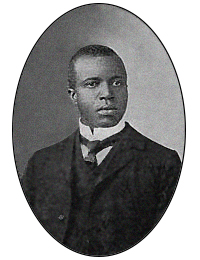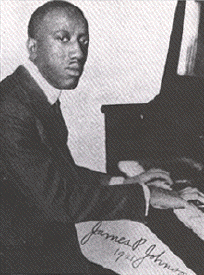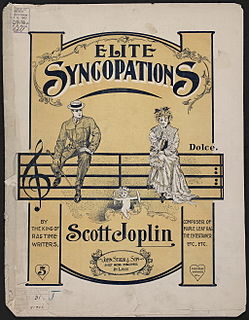
Scott Joplin was an American composer and pianist. Joplin achieved fame for his ragtime compositions and was dubbed the King of Ragtime. During his brief career, he wrote 44 original ragtime pieces, one ragtime ballet, and two operas. One of his first and most popular pieces, the "Maple Leaf Rag", became ragtime's first and most influential hit, and has been recognized as the archetypal rag.

Joseph Francis Lamb was an American composer of ragtime music. Lamb, of Irish descent, was the only non-African American of the "Big Three" composers of classical ragtime, the other two being Scott Joplin and James Scott. The ragtime of Joseph Lamb ranges from standard popular fare to complex and highly engaging. His use of long phrases was influenced by classical works he had learned from his sister and others while growing up, but his sense of structure was potentially derived from his study of Joplin's piano rags. By the time he added some polish to his later works in the 1950s, Lamb had mastered the classic rag genre in a way that almost no other composer was able to approach at that time, and continued to play it passably as well, as evidenced by at least two separate recordings done in his home, as well as a few recorded interviews.

James Price Johnson was an American pianist and composer. A pioneer of the stride style of jazz piano, he was one of the most important pianists who bridged the ragtime and jazz eras, and, with Jelly Roll Morton, one of the two most important catalysts in the evolution of ragtime piano into jazz. As such, he was a model for Count Basie, Duke Ellington, Art Tatum, and Fats Waller.
Artie Matthews was an American songwriter, pianist, and ragtime composer.

The "Maple Leaf Rag" is an early ragtime musical composition for piano composed by Scott Joplin. It was one of Joplin's early works, and became the model for ragtime compositions by subsequent composers. It is one of the most famous of all ragtime pieces. As a result Joplin was called the "King of Ragtime". The piece gave Joplin a steady if unspectacular income for the rest of his life.

May Frances Aufderheide Kaufman was an American composer of ragtime music. She was probably the best known among female ragtime composers. She received training in art music and visited Europe on a grand tour, yet decided to compose in ragtime.
Thomas Million John Turpin was an African-American composer of ragtime music.

Charles Leslie Johnson was an American composer of ragtime and popular music. He was born in Kansas City, Kansas, died in Kansas City, Missouri, and lived his entire life in those two cities. He published over 300 songs in his life, nearly 40 of them ragtime compositions such as "Doc Brown’s Cakewalk", "Dill Pickles", "Apple Jack ", and "Snookums Rag". His best selling piece, a sentimental ballad called "Sweet and Low", sold over a million copies. Experts believe that had Johnson lived and worked in New York, he would be included alongside Scott Joplin, James Scott, and Joseph Lamb as one of the greatest ragtime composers. He wrote more than the other three combined and exemplified a greater range of talent, composing waltzes, tangos, cakewalks, marches, novelty pieces, and other types of music popular at that time.
Percy Wenrich was a United States composer of ragtime and popular music.

Arthur Willard Pryor was a trombone virtuoso, bandleader, and soloist with the Sousa Band. He was a prolific composer of band music, his best-known composition being "The Whistler and His Dog". In later life, he became a Democratic Party politician from New Jersey, who served on the Monmouth County Board of Chosen Freeholders during the 1930s.

"The Entertainer" is a 1902 classic piano rag written by Scott Joplin. It was sold first as sheet music, and in the 1910s as piano rolls that would play on player pianos. The first recording was by blues and ragtime musicians, the Blue Boys in 1928, played on mandolin and guitar.
Bluin' the Black Keys is a "piano novelty" composed by Arthur Schutt, an early jazz pianist and arranger. It was issued by Robbins-Engel in 1926, and was one of the few published novelties issued by Arthur Schutt. Featuring extreme chromaticism and unusual syncopation it is particularly difficult for a traditional ragtime arrangement. Though never recorded by its composer, it has been recorded in recent years by pianists such as Tony Caramia, George Hicks, and Brian Holland.

"Original Rags" was an early ragtime medley for piano.
It was the first of Scott Joplin's rags to appear in print, in early 1899, preceding his "Maple Leaf Rag" by half a year.

"Weeping Willow" is a 1903 classic piano ragtime composition by Scott Joplin.
It was one of Joplin's simpler and less famous ragtime scores, written during a transitional period in his life, and one of the few pieces that Joplin cut as a piano roll in a 1916 session.
Sue Keller is an American ragtime, blues and jazz pianist and singer, who has released several albums. She studied flute and took voice lessons, played guitar, and sang in school operas. After a wide variety of musical jobs, she started concentrating more on vintage jazz and ragtime. In 1992, Sue Keller established Ragtime Press to publish rags by little-known composers, and the HVR label to document her music. On YouTube there are a number of videos of her performing music by Laura Nyro, W. C. Handy, Scott Joplin, Ray Charles and others. Keller is a graduate of DePauw University.
John F. Barth (1874–1947) was an American composer of popular music.

"Elite Syncopations" is a 1902 ragtime piano composition by American composer Scott Joplin, originally published in 1903 by John Stark & Son. One of his more popular works, it is one of a handful of Joplin's rags for which he recorded a piano roll. The cover of the original sheet music prominently features a well-dressed man and lady sitting on a treble staff, looking down upon a cherub clutching a cymbal in each hand, which reflects plainly the title of the piece. In 1974, the British Royal Ballet, under director Kenneth MacMillan, created the ballet Elite Syncopations based on tunes by Joplin and other composers of the era.

Wall Street Rag is a ragtime composition by Scott Joplin, first published in 1909. As indicated by the title, the theme is based on Wall Street following the events surrounding the Panic of 1907 which is represented in the musical structure along with its corresponding annotations.












